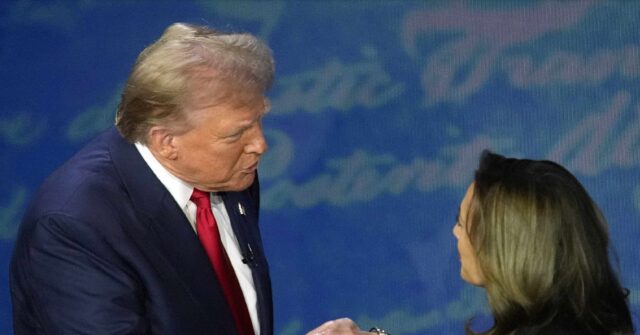A recent Wall Street Journal poll has revealed a tightly contested race between former President Donald Trump and Vice President Kamala Harris, with Trump leading Harris by a single point nationwide. The survey, which focuses on battleground states central to the upcoming presidential election, shows Harris holding narrow leads in Arizona, Michigan, Wisconsin, and Georgia, while Trump has a slight edge in Nevada, North Carolina, and Pennsylvania. Despite these fluctuations, no candidate has a lead larger than 2 percentage points, with the exception of Trump’s 5-point advantage in Nevada, signaling an extremely close election landscape. The data highlights that both candidates are essentially in a dead heat in swing states, which are crucial for securing an Electoral College victory.
In terms of voter issues, the survey indicates that Trump is viewed more favorably than Harris when it comes to key areas such as handling the economy and immigration. Trump garners a 10-point advantage over Harris regarding economic management, the most significant concern for voters. Furthermore, he leads by 16 points in immigration and border security, which ranks as the second most pressing issue. This economic sentiment is pivotal as polling suggests that voters perceive the overall national economy as poor, contrasting with their more favorable views on local economic conditions. As the economy often plays a decisive role in electoral behavior, these factors may heavily influence voting preferences moving forward.
For Harris to secure victory, the Journal implies that her chances could lie within Sun Belt states like Arizona, where demographics have shifted due to a migration of liberal voters from the Midwest and Northeast. This demographic change is crucial for Harris, as these states have become increasingly competitive due to an influx of diverse voters looking for political representation. Nonetheless, Harris faces significant challenges, particularly in northern industrial states where President Biden led by more than five points at a similar timeframe in 2020. Her struggles in these critical areas could hinder her path to the presidency.
An interesting finding from the poll suggests that, although voters describe the national economic situation as unfavorable, they tend to view their local economies positively. This dichotomy illustrates a complex voter mindset that may not be fully conducive for Harris, as the election’s outcome could lean towards candidates who resonate more closely with voters’ immediate concerns. Furthermore, the poll indicates a perception of extremity associated with the candidates, with Trump being described as “extreme” by 48% of voters compared to 38% for Harris. Such perceptions contribute to the narrative surrounding each candidate and could play a crucial role in influencing undecided voters.
The Journal’s findings coincide with a separate NBC poll indicating a similarly tight race, with Trump maintaining a one-point lead over Harris. As both polls signal a highly competitive election cycle, the implications for each candidate’s campaign strategy could lead to intensified focuses on battleground states and specific voter demographics. With the election approaching, both candidates will likely seek to strengthen their positions on key issues while addressing perceptions that could sway undecided voters.
In summary, the Wall Street Journal and NBC polls illustrate a fiercely contested election, with slight margins separating Trump and Harris across swing states. As voters prioritize economic issues and local economic health, Trump’s leads in these categories could prove to be significant advantages. While Harris’s strength may be found in certain demographic shifts in emerging states like Arizona, her performance in traditional Democratic strongholds raises concerns. The upcoming campaign strategies from both sides will not only reflect the current polling data but will also attempt to address the evolving economic sentiments among voters as the race draws closer to the election date.

